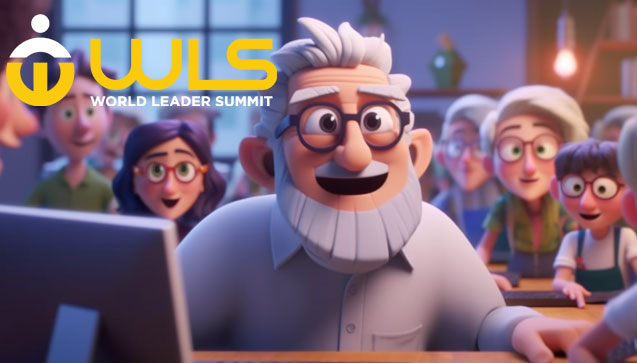
In the realm of global politics and diplomacy, attending and speaking at a World Leader Summit is an unparalleled opportunity for heads of state, government officials, and influential figures to shape the course of international affairs. The World Leader Summit 2023 is set to be a milestone event, bringing together leaders from around the globe to discuss pressing issues, foster cooperation, and forge new paths for a better future. This article explores the profound impact that attending and speaking at such a summit can have on world leaders and the outcomes they can achieve.
1. Enhancing Global Influence
Attending and speaking at the World Leader Summit 2023 provides an unmatched platform for world leaders to project their ideas, policies, and visions to a global audience. The summit offers a unique opportunity to address fellow heads of state, diplomats, and international media simultaneously, allowing leaders to shape the narrative on critical issues. By showcasing their expertise and articulating compelling arguments, world leaders can significantly enhance their global influence and reputation.
2. Strengthening Diplomatic Relationships
One of the significant advantages of attending the World Leader Summit is the chance to engage in high-level diplomacy and build relationships with counterparts from various nations. Face-to-face interactions on the summit sidelines, during bilateral meetings, and at social gatherings foster mutual understanding and trust. These interactions can pave the way for future collaborations, negotiations, and agreements, leading to strengthened diplomatic ties and greater cooperation on shared challenges.
3. Addressing Global Challenges
The World Leader Summit serves as a platform to confront and address complex global challenges. By participating in panel discussions, delivering keynote speeches, and engaging in interactive sessions, world leaders can voice their concerns, share best practices, and propose innovative solutions. The summit enables leaders to collaborate with their peers and global experts, leading to a comprehensive understanding of complex issues such as climate change, economic inequality, and international security. Through dialogue and cooperative efforts, leaders can forge consensus, initiate policies, and inspire action on a global scale.
4. Showcasing National Priorities and Initiatives
Attending the World Leader Summit allows heads of state to showcase their nation’s priorities and highlight ongoing initiatives. Through carefully crafted speeches and presentations, leaders can demonstrate their country’s achievements, innovative policies, and commitment to global cooperation. Such exposure can attract investment, foster international partnerships, and inspire other nations to replicate successful models, ultimately contributing to national growth and development.
5. Inspiring Hope and Unity
Leaders’ participation and speeches at the World Leader Summit can have a profound impact on inspiring hope and unity among their citizens and the international community. By emphasizing shared values, calling for collective action, and highlighting the potential for positive change, leaders can rally support and galvanize public opinion. Their words and actions can ignite a sense of purpose, mobilize resources, and foster a renewed commitment to building a more inclusive, peaceful, and sustainable world.
The World Leader Summit 2023 presents an exceptional opportunity for heads of state and influential figures to make a lasting impact on the global stage. By attending and speaking at such a summit, leaders can enhance their global influence, strengthen diplomatic relationships, address global challenges, showcase national priorities, and inspire hope and unity. The profound outcomes of their participation extend beyond the summit itself, with the potential to shape policies, foster cooperation, and contribute to a brighter future for all nations.
Education plays a crucial role in helping individuals choose the right career path. Here are some ways education facilitates career decision-making:
1. Exploration of Interests: Education exposes individuals to a wide range of subjects and disciplines, allowing them to explore their interests and passions. Through various courses and academic pursuits, individuals can discover what topics resonate with them the most and align with their natural abilities. This exploration helps in narrowing down the potential career options.
2. Self-Discovery and Personal Growth: Education not only imparts knowledge but also fosters personal growth. It helps individuals develop a deeper understanding of themselves, their strengths, weaknesses, and values. This self-awareness is vital in choosing a career that aligns with one’s personality, values, and long-term goals. Education provides opportunities for self-reflection and exploration of various career possibilities.
3. Exposure to Career Paths: Within the education system, students often have access to career counseling services, mentorship programs, and internships that expose them to different professions. Through these avenues, individuals can gain valuable insights into various career paths, learn about job responsibilities, and interact with professionals working in their fields of interest. This exposure aids in making informed decisions about career choices.
4. Acquiring Knowledge and Skills: Education equips individuals with knowledge and skills that are essential for different careers. Academic programs provide specialized training and education in specific fields, allowing individuals to gain in-depth knowledge and expertise. This knowledge forms a strong foundation for pursuing careers that require specific qualifications or technical skills. Education also develops transferable skills such as critical thinking, problem-solving, communication, and teamwork, which are valuable across various professions.
5. Networking Opportunities: Education provides opportunities for networking with peers, faculty members, and professionals in various industries. Building connections within the educational environment can lead to mentorship, internships, and job placement opportunities. Networking enables individuals to gather insights about different career paths, gain guidance from experienced professionals, and open doors to potential job prospects.
6. Access to Career Resources: Educational institutions often offer career resource centers, libraries, and online platforms that provide access to career-related information, job boards, industry reports, and guidance materials. These resources assist individuals in researching different career options, understanding the job market, and evaluating the future prospects of specific industries. They also provide information about the educational requirements and qualifications necessary for different career paths.
7. Continued Learning and Adaptability: Education is a lifelong process, and it instills a mindset of continuous learning. In today’s dynamic job market, where skills and industries evolve rapidly, education prepares individuals to adapt to change and acquire new knowledge and skills throughout their careers. This adaptability helps individuals navigate career transitions, upskill or reskill as needed, and remain competitive in the ever-changing job landscape.
In summary, education plays a crucial role in helping individuals choose the right career by providing opportunities for self-exploration, exposing individuals to various career paths, developing relevant knowledge and skills, offering networking opportunities, and providing access to career resources. It equips individuals with the necessary tools and information to make informed decisions about their career paths, aligning their interests, strengths, and values with their chosen professions.

Copyright © 2022 World Leader Summit. All rights reserved.


